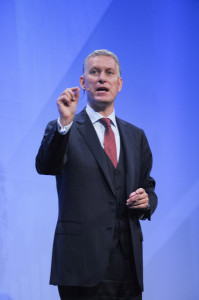
Gartner kicked off its annual Symposium/ITxpo conference at Madinat Hotel on 1st April, and the overriding emphasis of the event was digitalisation.
Over 500 CIOs and IT leaders from across the Middle East were in attendance, and were treated to an animated series of keynote speeches by five of the research firm’s leading delegates.
Peter Sondergaard, Senior Vice President and Global Head of Research, Gartner, provided the latest outlook for the IT industry “The Middle East is projected to reach $243 billion by 2018, which will represent 5.6 percent of worldwide IT spending,” he said. “Areas of emerging expansion such as mobility, smart government, big data and Internet of Things (IoT), will prove to be critical in the ongoing transformation and modernisation process of the region. In addition, large IT investments by verticals such as communications, media and services, banking and securities, government, manufacturing and natural resources, offer strong opportunities for technology and service providers.”
“Critical to the UAE is to leverage the diverse existing foreign human capital by accelerating investment in higher education institutions, startups, IT innovation, and creating a ready pool of resources ripe for internal and external investment.”
Middle East IT spending is projected to total $211 billion in 2014, an 8 percent increase from 2013, according to the latest forecast by Gartner.
Sondergaard went on to stress the importance of CIOs embracing digitalisation, and the increasing necessity for organisations to introduce a Chief Digital Officer role.
He said that if CIOs do not embrace digitalisation in the next two years, their role would begin to lose significance. “The five capabilities of the 2020 technology digitalisation; digital technology architecture, enterprise information architecture, cyber security and risk, industrialised IT infrastructure and digital leadership must be adhered to, or the CIO’s authority could decay,” he said.
Sondergaard discussed how the current elite of vendors would lose their dominance by 2020, and would be replaced by new leaders. When pressed by CNME as to who would take this mantle, he said, “I see a blend of hardware and software vendors taking the lead in the digital age. With the emergence of trends like virtualisation and software defined networking we will begin to see blurred lines between hardware and software.”
Gartner believes that by 2020, one in three knowledge workers will be replaced by digital machines, and that the global value-add for the Internet of Things by then will reach $1.9 trillion.
Taking over from Sondergaard, Hung LeHong, Vice President and Fellow, Gartner, framed how a digital society will soon be inescapable, “In the future, we will live in the age where everything is digital; people, things, building and systems. As a result, organisations need to digitalise business processes, pursue digital business models, and compete for business moments.”
“Some people might think computers can one day be smarter than humans. Let me tell you a secret, they already are,” said David Willis, Chief of Research, Gartner. “The Internet of Things, 3D printing and the trend of automated judgment will transform our businesses, our economies and our lives.”
Dave Aron, Vice President and Fellow, Gartner, reinforced the idea that digitalisation is unavoidable, “Digital is not an add-on, option or afterthought, it’s a reality,” he said. “Less than a tenth of businesses now have Chief Digital Officers, but in the very near future one in three businesses will have one.”
Middle East spending on devices is forecast to reach $37 billion in 2014, up 24 percent from 2013. Devices are represented by mobile phones, media tablets, PCs, and printers, with mobile phones enjoying 30 percent spending growth in 2014. Mobile phone spending is forecast to surpass US$39 billion in 2018.
“Mobile phone adoption has been paramount in human and business development. With new apps proliferating, users in general will continue enhancing communications and economic growth at various levels of the society in the ME,” Sondergaard said. “ME users have been adopting iOS and Android-based devices at a fast pace. The demand for premium and basic phones is maintained by the short replacement cycles – some countries, such as Bahrain and Qatar, have replacement cycles that are close to one year or less, while the global average for these phones is more than two years.”
In 2014, ME software spending is forecast to grow nearly 12 percent over 2013. ME accounts for about 1.4 percent of global software spending, and it has good long-term prospects for enterprise software vendors looking for new growth. Software hotspots are in large organisations in the telecom, banking, air travel and defense sectors, as well as central government and the natural resources sector. Most money is spent on database management systems, operating systems, enterprise resource planning and application infrastructure and middleware.
The telecom services market continues to be the largest spending market, representing 74 percent of total IT spending in the region in 2014. Gartner’s analysis shows that telecom services will achieve almost 5 percent growth in 2014, with mobile voice services reaching $93 billion and mobile data services $27 billion.
To round off the opening keynote of the Symposium, Gartner’s delegates who had spoken returned to the stage with some final words of advice for the room of CIOs. “CIOs must become inspirational digital leaders,” Willis said. “If you take anything away from today, remember these pieces of advice,” said Sondergaard. “Digitalise your best products. Remember that every technology consumer constitutes a technology company in their own right. And broaden your leadership focus to the digital ecosystem.”





